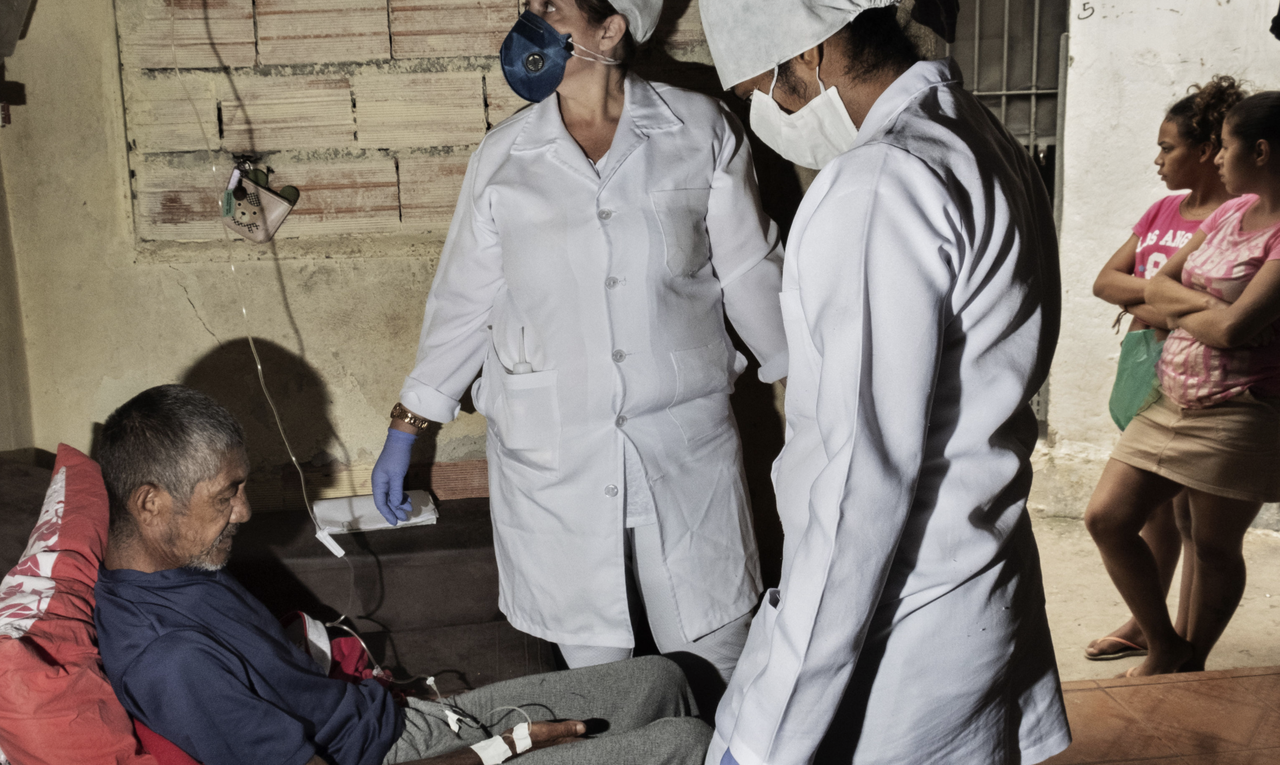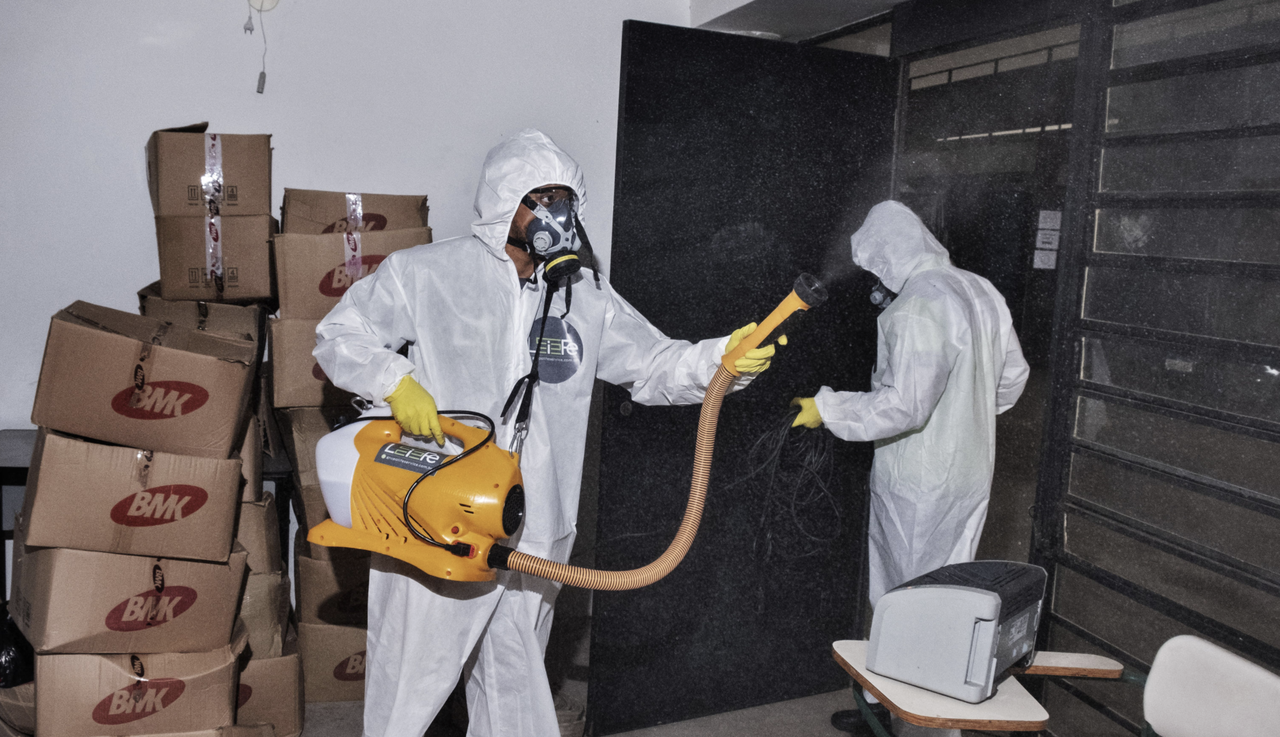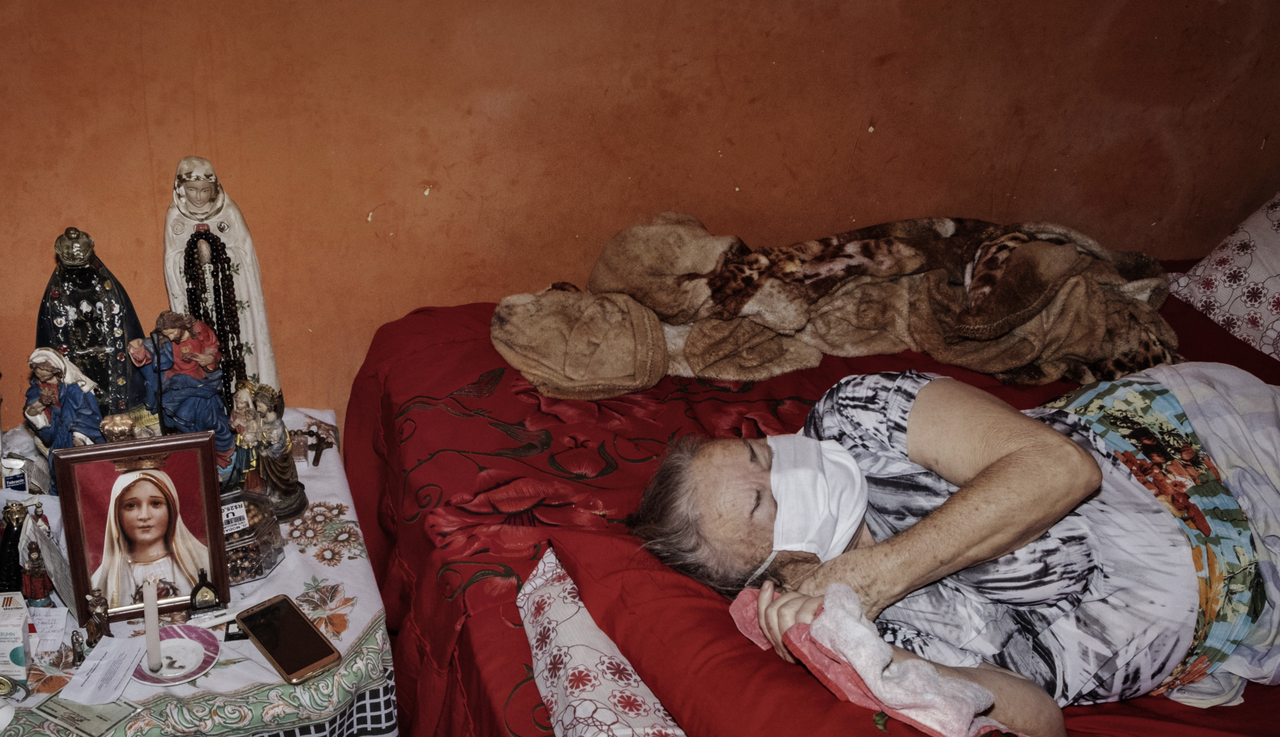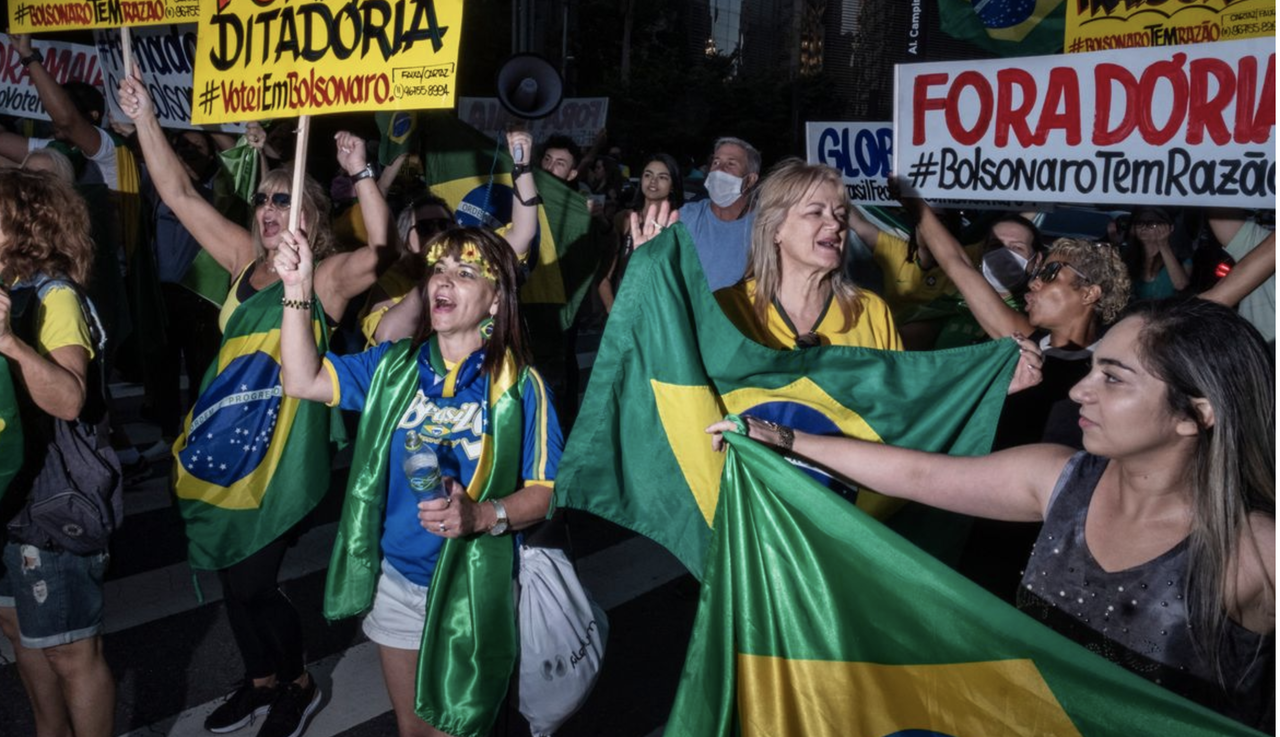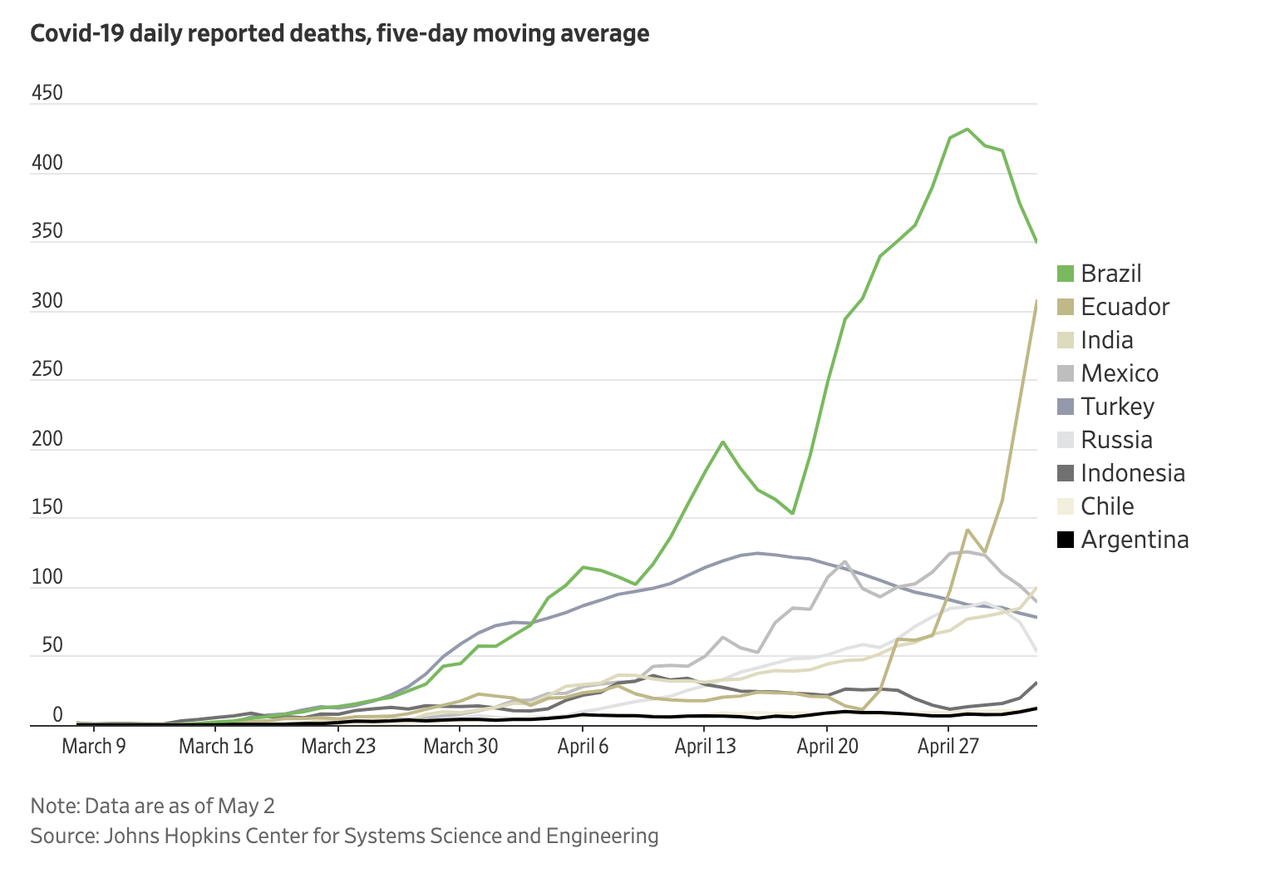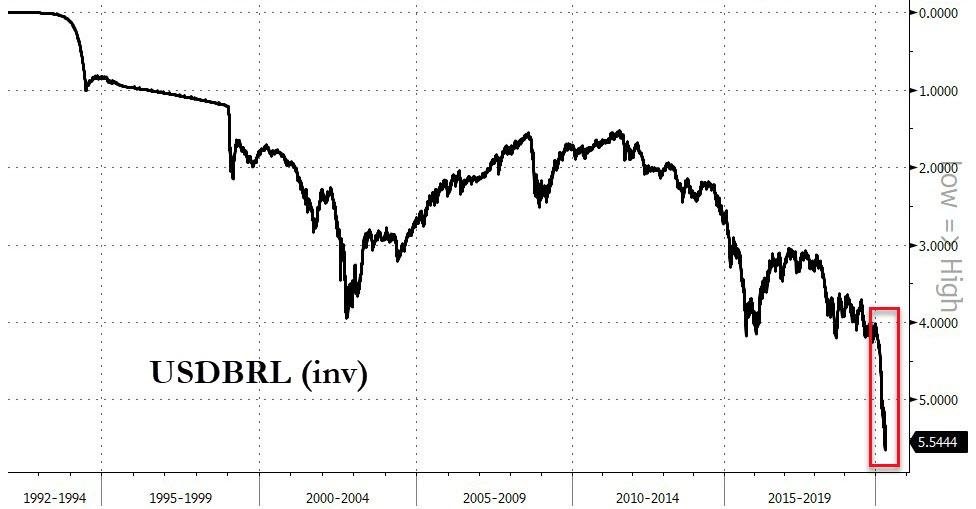“We Ask For Help But It Never Comes”: Dead Are Left To Rot, Then Buried In Mass Graves, As Coronavirus Overwhelms Brazil
Because of its size – both geographically and population-wise, as well as its economic heft – Brazil is often compared to the US. And when it comes to the progression of the coronavirus, it’s probably one of only a handful of countries (one other being perhaps India) where an apples-to-apples comparison might be most relevant.
Fortunately for Americans, President Trump has done a much more effective job at combating the virus in the US than his Brazilian counterpart Jair Bolsonaro – a former far-right Congressman known to some as “the Tropical Trump”. Bolsonaro has infamously continued to deny the virus’s severity, dismissing it as “a little flu”, while Brazil continues to post some of the lowest testing rates in the world.
This has allowed the virus to explode without much resistance, leading researchers at the University of Sao Paolo to project that more than 1.6 million Brazilians have likely already been infected (out of a population of roughly 209 million). In some of Brazil’s poorest, most remote villages, the outbreak has overwhelmed health-care systems.
Many corpses have been left inside homes for more than a day after death until they could be collected, a scenario that briefly played out in parts of Italy.
An expansive WSJ report published Monday explores the situation in Brazil, and concludes that as all of the country’s biggest cities and many of its wealthier provinces start to reopen, there’s concern that the country could single-handedly reignite the outbreak in the western hemisphere.
The report begins in the state of Manaus, a remote Amazonian province.
In the tiny, stifling home she shared with seven relatives in the Amazon, Maria Portelo de Lima began coughing, started feeling weaker and, over a week, got sicker and sicker.
Her family tried to get the 61-year-old to a hospital in Manaus, a city of 2.2 million in the heart of the rainforest. They were told no ambulances were available or hospital beds free because of a flood of coronavirus patients.
[…]
Ms. de Lima died April 26. With so many other Covid-19 victims in the city, it took 30 hours for an ambulance to pick up her body. She was buried in a mass grave, her identity marked by a wooden cross that cost $22.
In Manaus, Ms. de Lima’s death was among hundreds that have put that Amazon River city at the heart of Brazil’s coronavirus struggle. It is a place with far too few hospital beds and other health-care facilities to cope with such a disease outbreak.
Ms. de Lima’s niece, Rosa Alves, had frantically but unsuccessfully sought aid as her aunt’s condition worsened. “We feel humiliated. We pay taxes and when we need help, we ask for it and help never comes,” Ms. Alves said.
Manaus buried about 140 bodies the day Ms. de Lima died, six times the normal rate, according to its mayor, Arthur Virgilio. The mayor, a 74-year-old who described himself as stoic in the face of past tragedies, has openly wept as he watches his hometown buckle and his people suffer. On a recent night, learning of mass burials in the city, he broke down.
“I am asking for more help from Brasilia, we are at our limits,” Mr. Virgilio said. “We are heading for the peak, we need help from the federal government and the international community.”
The fast spread of the virus in Manaus, which is a hub for jungle safaris by American and European tourists, raises a note of caution for wealthy nations in the Northern Hemisphere. Hopes that coming warm weather will slow the virus clash with the mounting toll in a steamy city where the average April high was around 87 Fahrenheit.
Photos published with the report showed scenes of health-care workers overwhelmed by the profusion of cases in urban “favelas” – poor, densely packed slums offering ideal breeding conditions for the virus.
Per WSJ: “Medical workers check a man with breathing problems in the São Paulo’s favela of Paraisópolis. A scarcity of coronavirus tests in Brazil limits them to health and safety professionals, the very sick and those who died and are suspected of having the virus.”
Per WSJ: “Medical personnel disinfect rooms in a Paraisópolis sports hall used as a place to treat coronavirus patients. The virus is spreading in poor districts such as the favella, where 120,000 live in less than two square miles.”
Per WSJ: “An elderly Covid-19 patient in her house in Paraisopolis.”
In a testament to the virus’s varied effects (depending on the patient, it can be deadly, or extremely mild), Bolsonaro’s continued denials have left many Brazilians confused about who can and can’t catch the virus.
“People think the coronavirus is a rich man’s disease, that only those who travel catch it,” said Claudio Rodrigues Melo, who set up a soup kitchen for needy neighbors in one of São Paulo’s poorest areas.
Echoing Fox News’ initial denounciation of the virus as a “media conspiracy”, many in Brazil believe that it’s just a conspiracy, or only impacts the elderly.
“Or they think it only impacts the elderly, or even that it’s fake news, something made up by the Globo news network to discredit Bolsonaro,” he said.
And many supporters of the president have gathered to protest local lockdown orders at his exhortation, rallies far larger than comparable movements in the US.
Brazil boasts some of the lowest testing rates in the world, with only 1,600 tests per million residents, far below the US’s 33,000 per million rate.
Yet, despite this, Brazil has seen the number of confirmed cases balloon, alongside deaths.
A doctor from Ribeirão Preto Medical School who worked on the study projecting 1.6 million infections in Brazil claimed with little doubt that “Brazil is already the global epicenter of the coronavirus.”
At this point, with states already reopening, turning around and forcing a complete shutdown probably isn’t politically feasible.
The share of people supporting social isolation in a survey taken last week fell to 52% from 60% in the first week of April, according to pollster Datafolha. And among Brazilians with smartphones that can be tracked, only 40% appear to be adhering to stay-home measures, said In Loco, a tech company focused on geolocation data.
Data from Google’s Covid-19 Community Mobility Reports show growing numbers of Brazilians out shopping and going to work in the past two weeks, while Chileans and Colombians stay home.
The state of Santa Catarina in Brazil’s affluent south was the first to reopen, a little more than a week ago. Women and children thronged an upscale shopping center in the city of Blumenau.
The mall laid out a red carpet for the shoppers. Store employees lined up outdoors to greet them, while a saxophonist played Creedence Clearwater Revival’s “Have You Ever Seen the Rain?” All precautions were taken to protect customers, according to the mall’s owner.
But even some of the country’s most populous and economically important states are seeing hospitals being hopelessly overrun. Rio state has so many coronavirus patients that the waiting list for an ICU bed or a respirator is 360 patients long, according to the state’s health secretary Edmar Santos.
“We are on the verge of collapse,” he said. “We will quickly see chaos, not just in Rio de Janeiro, but in all of Brazil.”
Santos himself tested positive for coronavirus in April but has returned to work.
Like in the US, poorer working class workers say that if given the choice between starving and putting themselves at risk, they will gladly choose the latter.
Ryan Cesar Martins, 27, said he couldn’t afford to honor the social-isolation rules imposed by the state’s governor in March. He said a car-painting business he ran that earned him nearly $1,300 in January brought in less than $100 in April. His wife, Keila Evellin, 22, lost her off-the-books job as a saleswoman. They have maxed out their credit cards.
On Thursday, Mr. Martins went to work as an employee of another car-painting shop.
“If it’s a choice between getting the coronavirus and dying of hunger, I prefer not to die of hunger, so I’m going back to work,” Mr. Martins said.
Still, despite these horrible scenes, Brazil’s economy and social fabric have remained mostly intact, although capital flight looks to be accelerating…
When all this is said and done, we suspect Brazil’s response will be an important reference point as the world tries to evaluate the approaches espoused in Europe, the US and elsewhere.
Tyler Durden
Tue, 05/05/2020 – 22:25
via ZeroHedge News https://ift.tt/2xC1Php Tyler Durden
